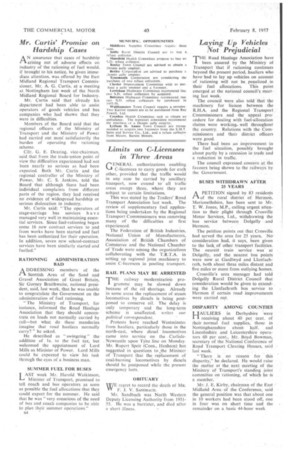Mr. Curtis' Promise on Hardship Cases
Page 38

If you've noticed an error in this article please click here to report it so we can fix it.
AN assurance that cases of hardship arising out of adverse effects on industry of the rationing of fuel would, if brought to his notice, be given immediate attention, was offered by the East Midland Regional Transport Commissioner, Mr. A. G. Curtis, at a meeting at Nottingham last week of the North Midland Regional Board for Industry.
Mr, Curtis said that already his department had been able to assist operators of goods vehicles and bus companies who had shown that they were in difficulties.
Members of the Board said that the regional officers of the Ministry of Transport and the Ministry of Power had carried out most satisfactorily the burden of operating the rationing scheme.
Cllr. G. E. Dearing, vice-chairman, said that from the trade-union point of view the difficulties experienced had not been nearly so serious as had been expected. Both Mr. Curtis and the regional controller of the Ministry of Power, Mr. C. S. Jenkins, told the Board that although there had been individual complaints from different parts of the region, they had received no evidence of widespread hardship or serious dislocation in industry.
Mr. Curtis said: " The operators of stage-carriage bus seuvices have managed very well in maintaining essential services. Since fuel-rationing began some 16 new contract services to and from Works have been started and fuel has been authorized for their operation. In addition, seven new school-contract services have been similarly started and fuelled."
RATIONING ADMINISTRATION BAD
ADDRESSING members of the Scottish Area of the Sand and Gravel Association of Great Britain, Sir Gurney Braithwaite, national president, said, last week, that he was unable to congratulate the Government on the administration of fuel rationing.
"The Ministry of Transport, for instance, informed the Road Haulage Association that they should concentrate on loads not normally carried by rail—but what do these mandarins imagine that road hauliers normally carry?" he asked.
He described as " swingeing" the addition of Is. to the fuel tax, but welcomed the appointment of Lord Mills as Minister of Power. Lord Mills could be expected to view his task through the eyes of a business man.
SUMMER FUEL FOR BUSES
LAST week Mr. Harold Watkinson, Minister of Transport, promised to tell coach and bus operators as soon as possible the fuel allocations that they could expect for the summer. He said that he was "very conscious of the need of bus and coach companies to be able to plan their summer operations."




































































































